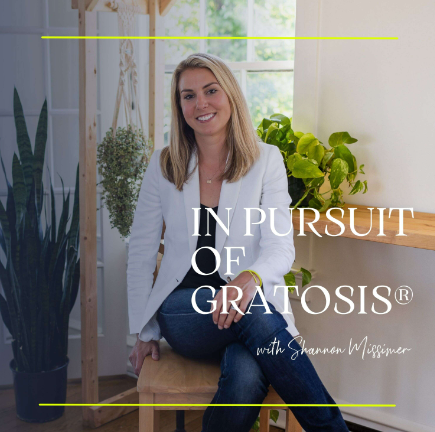Q&A with Audrey Green, Founder of Sentient Marketing and Shannon Missimer, host of In Pursuit of Gratosis® a podcast which explores a life lived with gratitude.

SHANNON: I would love to just hear your story. From starting out as an environmental science teacher to getting into marketing. I would love it if you just shared how that journey evolved and unfolded.
AUDREY: I actually have always been a little bit of a hippie as far as repurposing things as far as they would go. And I did teach science in 2014, when we were really starting to take climate change more seriously and I felt a genuine responsibility, teaching my students about that. And they were like, “What can I do? How can we make a change? We’re 14, we’re 15–What can we do to fix this problem that we’ve inherited?”
So, it was really interesting, and exciting, working with students, but I felt like maybe the timing of being a teacher just wasn’t right. I felt like I needed to do something now. Maybe move towards either nonprofits who are trying to correct issues or going straight to corporations, startups, etc. and helping them move the needle in the right direction. So that was my big dream when I decided, “I’m going to put teaching on the shelf.”
And at that same time, I did have the opportunity. I moved up to California, which is where all these opportunities opened up that allowed me to get into marketing. So yeah, it’s one of those things looking back: it’s like wow, it kind of always was mytrue north.
But I do think that becoming a teacher was the most important and most impactful thing I’ve done and that led me to where I am today. So, it really was a needed part of my journey.
Oh, it’s so cool how you knew you wanted to move the needle and have an impact. So, share a bit more about that marketing journey.
I moved because my now fiancé got a job opportunity that moved to California. So, I moved without knowing exactly what the next step was. I was like, “Okay, I know I’m going to put teaching on the shelf. I have this dream. How do I get there?”
I found an opportunity with a local nonprofit, and they utilized me for marketing capacity and it just kind of clicked for me. I also started making friends in the area and building my network. I started to meet people who were working on nonprofits, and, in the San Diego area, sustainability is extremely common. There are a lot of initiatives. This was 2018, pretty much every coffee shop you go to would already have compostable cups and all of that. It’s a part of the culture there.
It was pretty easy to get involved with a couple of startups that needed some marketing help and they just kind of took off from there. So yeah, it was not easy at the time. But looking back– one connection led to the next connection etc. When you’re passionate and you’re in this space, other people light up, you light up. They just really want to use you even if most of your work experience is in education.
SM: You can feel the passion behind the topic when you’re talking about it. There’s energy together. Intention. And that’s contagious.
So, share a little bit about Sentient. How did this begin and how has it evolved?
So, I was working with a lot of nonprofits, I was doing marketing in my nine-to-five job where I was like, man, there’s so many clients that I’m so passionate about. And I really wanted to have a little bit more control over that and do that full time.
I was also very vocal about ethical marketing. I think it’s still kind of like a novel concept, but back in 2018, I started to come up with some marketing strategy and brand identity for the startup that I was working with. It was just very values driven. It was like, “We don’t want anybody to be a customer who doesn’t align with our mission and our values.” I think it’s pretty interesting, because now it’s so ingrained, but back, I don’t know, just a few years ago…Patagonia was the only one doing it.
I felt like something was just missing. That was the type of work that was lighting me up and what I was spending most of my time on just wasn’t quite fulfilling me the same way. So, very early in 2022, I just decided that I could freelance full time–but really, I’d love to build something.
I’d love for something that’s more an agency style where we can really go into depth with each client. There could be a whole team that comes together that could build a work culture of everybody who was also passionate about this, and it would just take off and spiral into like a beautiful way to educate others. “You don’t have to be a sustainable brand in order to utilize ethical marketing, ethical decision making.” So, I really want this to be a ripple effect that has the most touch points and is more than just a freelancing opportunity. So, I decided to just go for it.’
What is ethical marketing? What did it mean to you?
It’s more integrity marketing. It’s basically saying, “Our brand has a personality, it has values, it has a mission, and that drives everything we do. We might change our products over time, we might look a little different. We might rebrand at some point. But ultimately this is what we stand for. If you align with this, we’d love to have a relationship with you.”
So, it’s like a hippie way to explain it, but there’s so many things that go into it. It’s never using tactics or quick sale techniques that are going to make a sale that doesn’t ultimately lead to brand loyalty and a good reputation.
Are you seeing a trend in that direction with the clients you’re working with now?
I think what’s really nice is most of the business owners I know are early-stage startups. And it’s so beautiful. Because the world is their oyster as far as brand identity. You know, what are your vision, mission, ethical beliefs? We can come up with that together early, and that’s really, really fun.
But I have also had people clients reach out that are like, “Hey, we’ve been around for a few years and we feel like we didn’t really start off on the right foot. So how can we kind of fix this approach?” Or maybe they were guided in that direction. It’s never too late to decide, okay, I want to make sure that all of my messaging, my graphics, and my content from this point on is going to be include ethical principles.
One; it is going to lead to a long-term relationship with your customer. So, good business ethics really are a way to pad your bottom line and ensure a positive reputation. But two; customers want this, they’re craving it. People will spend more money to have this type of trust with businesses because they’re manipulated so often and they’re tired of it, right? I feel that way.
Are a lot of your clients eco-conscious businesses or are they looking to create that level of trust within their communities?
It’s funny, I think when I first came up with my concept, a lot of my experience was working for eco-friendly brands, like what you’re describing. So, I thought I would just keep on with that train. But I found that I actually got more interest from social impact entrepreneurs than specifically eco-conscious. It’s a nice little mix at this point.
What is the best part of working with these brands?
What’s really, really, beautiful is some of the brands are creating solutions to problems that most people don’t even think about. Their business decisions include things like, “We’re a skincare line and we’re going to give back; but we’re also intentionally making sure this is inclusive of all types of women. We’re going to make sure that this is a long lasting, high-quality product. The design of the bottle has to make sure that you’re getting the most product out of it, because we are customer focused. That’s our value.”
So, everything they do, they do around it. It is an eco-friendly product because it’s post-consumer plastic and everything’s recyclable, so there is that component in it–But they’re not selling themselves as “the eco-friendly skincare line,” right?
It’s more social impact focused, like they stand for so many things. “Check out our values, read our mission statement, and we’re going to prove to you time and time again that his isn’t just lip service. We’re not just slapping a mission statement on an ‘About’ page and then not going back to it. Everything we do is ethical, intentional, and for you.”
That’s good business ethics. That’s the type of client I like to work with; they just really have a holistic approach.
How would you describe a social impact business? Somebody who at their core is living their mission and values?
As simple as it is, I think social impact is really just: Are you doing something to truly benefit society or gaps within our society? Things that are uplifting us, and leading us to more equality?
And I think that’s the tricky thing about sustainability, that we tie it so closely with eco-conscious. Sustainability is people plus planet. And I think that gets forgotten. Environmental responsibility is a part of it but– Why are we trying to save this planet? It’s so that we, as a species, and lots of other species that are lucky to be here, can have a future. So that we can have the right resources to continue with this life that we’ve been gifted.
It really comes from many angles. It’s not just that, you create a product that is made of hemp. That’s wonderful. But what else do you stand for? How are you socially responsible? What else are we trying to achieve here?
How do you connect with businesses that prioritize corporate social responsibility?
A lot of times we ask questions about why. Why do you start this? They’re so excited about what they’re working on, but what was the motivation behind it? If I am talking to somebody and there’s not that motivation– it doesn’t have to be well scripted or figured out at that point– but just being able to articulate that they’ve experienced this as a pain point or they’ve observed this as a pain point. This is how it’s impacted them, and they realized through x, y, & z thing that there is a solution and here it is.
That is like bells and whistles are going off. Yes! Let’s work together! That’s all it takes, in my opinion, to get you off the ground. It’s so impactful to have a great story. Sometimes I talk to people like, “Oh, you know, I have business experience and I saw a gap in the market.” Or “This is really popular right now. I know that statistically 70% of consumers will pay more” … Those answers are difficult to listen to.
Where’s the heart? We need the heart!
I think that there’s definitely plenty of businesses that started out that way, but they realize that they were passionate about it as they got into it. And that is beautiful in and of itself. So, there’s space to grow. But if they’re at a stage where they haven’t reached that yet. I don’t know if hiring us for ethical marketing assistance is quite going to get us there as a team.
How do you focus on a Customer First mentality and good business ethics with your own clients?
I think a lot of clients–when we do sales calls–are trying to determine best fit. We don’t just say oh, sign up for it. We both have to agree that this makes sense and that we’re on the same page together.
When some people hire a marketing agency, they decide, “Oh, I need marketing help. I don’t want to hire full time staff.” But ultimately, that is the goal; to have somebody on your team. So, it’s usually that you’re in this fragile state where there might be some money coming in. You could be crowdfunding, or using your own, but you’re really starting out pretty early. Maybe you’ve made some sales, but you’re really trying to like to go to the next level before you can hire that internal team.
So, I definitely see what we do as a steppingstone to get you closer to your goals as well. That’s definitely something that I think can be a little cringey when it comes to marketing agencies; when they’re like, “No, now you need this, and now you need that and stay with us forever.” I try to listen and figure out what exactly is serving you in order for you to reach your goals and grow. Because the clients I’m serving are the coolest thing about what I do. If it’s time to go and for you to hire somebody internally, and we got you to that place, then that’s amazing.
That’s something that I’d love to see more of in the marketing agency industry as a whole. Really serving the client and not just trying to make X amount of money per year. Of course, you do have to grow and stay alive as a business. But I think that a huge part of our mission is just: Are we genuinely serving somebody?
We want to make sure our values align with our clients because we want our client’s values to align with their customers values. It should all be intentional, at this point.
Do you have any advice for a start-up business on how to start marketing from an ethical point?
I’d say the first thing you have to do is really sit down and figure out what’s your unique value proposition? What are your values, what is your mission and your vision? Start there because it’s usually not something you can do in one hour. It takes iterating. It takes a lot of time and attention, but that’s going to help with what products you want to create and deciding who is your target market.
I know of a lot of times where the client says, “I just didn’t have time for that.” Or “I know what they are. I just haven’t written them down.” I think that you’re always spending more time trying to go back and figure them out. So always, always, always start there. Figure out what the personality is, and what matters to you.
I think it even goes into that new business owners get excited. They need a logo. They need some visual assets. There’s a lot of decision making. But it’s your value that should be deciding what that looks like, right? Even if you hire a freelancer or somebody to create those digital assets; they’re going to ask what you sell–but they also should be asking what emotion are you trying to evoke?
Essentially, what do you stand for, how do you want to get that across? So those values are the very first thing you can do, even before you really build out anything else. Incorporate your company then sit down and get that figured out.
Shannon: Beautiful. I think your business speaks so deeply about what you’re trying to do to help other people. You’re living and breathing everything that you’re helping other businesses to do. I have truly loved watching you create this and I’m excited to see the impact that it has, because it is so needed. There’s such a shift happening in business. More people and more consumers are looking for this, so the businesses are going to need the marketing to support it. I’m just so excited for what’s to come for you and your business.
The full interview can be found here. Copy courtesy of In Pursuit of Gratosis Podcast. Content has been added to and edited for clarity and ranking.

Looking for more?
Find more information about Shannon and the Motion of Gratitude on Instagram. Explore different options for The Experience, a 28-day guided Initiative of Intentional Gratitude, and of course, listen to Audrey and Shannon’s episode which is out now!
Thank you for being a part of the Sentient Marketing community–We are incredibly grateful.

+ Leave a comment